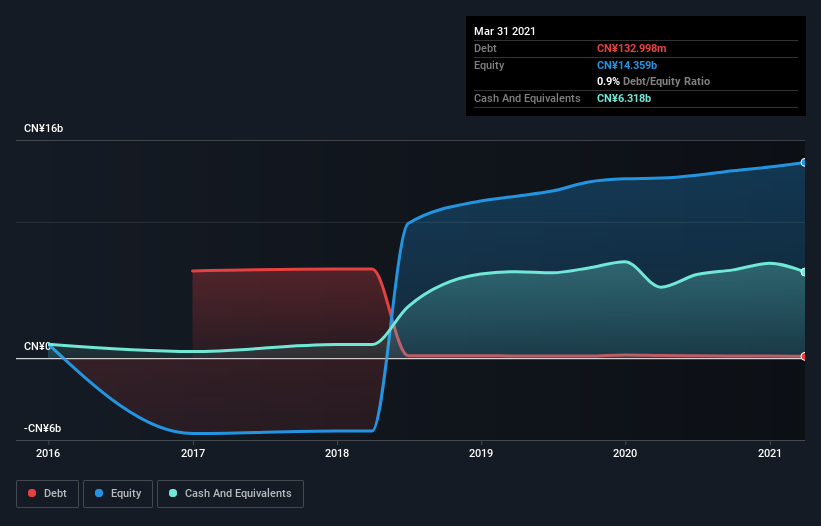
Warren Buffett famously said, 'Volatility is far from synonymous with risk.' It's only natural to consider a company's balance sheet when you examine how risky it is, since debt is often involved when a business collapses. We note that Tongcheng-Elong Holdings Limited (HKG:780) does have debt on its balance sheet. But should shareholders be worried about its use of debt?
Why Does Debt Bring Risk?
Debt assists a business until the business has trouble paying it off, either with new capital or with free cash flow. Part and parcel of capitalism is the process of 'creative destruction' where failed businesses are mercilessly liquidated by their bankers. However, a more frequent (but still costly) occurrence is where a company must issue shares at bargain-basement prices, permanently diluting shareholders, just to shore up its balance sheet. Of course, plenty of companies use debt to fund growth, without any negative consequences. When we examine debt levels, we first consider both cash and debt levels, together.
See our latest analysis for Tongcheng-Elong Holdings
What Is Tongcheng-Elong Holdings's Debt?
You can click the graphic below for the historical numbers, but it shows that Tongcheng-Elong Holdings had CN¥133.0m of debt in March 2021, down from CN¥190.1m, one year before. But on the other hand it also has CN¥6.32b in cash, leading to a CN¥6.19b net cash position.

A Look At Tongcheng-Elong Holdings' Liabilities
Zooming in on the latest balance sheet data, we can see that Tongcheng-Elong Holdings had liabilities of CN¥4.41b due within 12 months and liabilities of CN¥841.9m due beyond that. Offsetting this, it had CN¥6.32b in cash and CN¥905.2m in receivables that were due within 12 months. So it can boast CN¥1.97b more liquid assets than total liabilities.
This short term liquidity is a sign that Tongcheng-Elong Holdings could probably pay off its debt with ease, as its balance sheet is far from stretched. Succinctly put, Tongcheng-Elong Holdings boasts net cash, so it's fair to say it does not have a heavy debt load!
But the other side of the story is that Tongcheng-Elong Holdings saw its EBIT decline by 6.6% over the last year. That sort of decline, if sustained, will obviously make debt harder to handle. The balance sheet is clearly the area to focus on when you are analysing debt. But ultimately the future profitability of the business will decide if Tongcheng-Elong Holdings can strengthen its balance sheet over time. So if you're focused on the future you can check out this free report showing analyst profit forecasts.
Finally, a company can only pay off debt with cold hard cash, not accounting profits. While Tongcheng-Elong Holdings has net cash on its balance sheet, it's still worth taking a look at its ability to convert earnings before interest and tax (EBIT) to free cash flow, to help us understand how quickly it is building (or eroding) that cash balance. Over the last three years, Tongcheng-Elong Holdings actually produced more free cash flow than EBIT. That sort of strong cash generation warms our hearts like a puppy in a bumblebee suit.
Summing up
While it is always sensible to investigate a company's debt, in this case Tongcheng-Elong Holdings has CN¥6.19b in net cash and a decent-looking balance sheet. The cherry on top was that in converted 258% of that EBIT to free cash flow, bringing in CN¥2.1b. So we don't think Tongcheng-Elong Holdings's use of debt is risky. When analysing debt levels, the balance sheet is the obvious place to start. But ultimately, every company can contain risks that exist outside of the balance sheet. We've identified 2 warning signs with Tongcheng-Elong Holdings , and understanding them should be part of your investment process.
When all is said and done, sometimes its easier to focus on companies that don't even need debt. Readers can access a list of growth stocks with zero net debt 100% free, right now.
When trading stocks or any other investment, use the platform considered by many to be the Professional's Gateway to the Worlds Market, Interactive Brokers. You get the lowest-cost* trading on stocks, options, futures, forex, bonds and funds worldwide from a single integrated account. Promoted
Valuation is complex, but we're here to simplify it.
Discover if Tongcheng Travel Holdings might be undervalued or overvalued with our detailed analysis, featuring fair value estimates, potential risks, dividends, insider trades, and its financial condition.
Access Free AnalysisThis article by Simply Wall St is general in nature. It does not constitute a recommendation to buy or sell any stock, and does not take account of your objectives, or your financial situation. We aim to bring you long-term focused analysis driven by fundamental data. Note that our analysis may not factor in the latest price-sensitive company announcements or qualitative material. Simply Wall St has no position in any stocks mentioned.
*Interactive Brokers Rated Lowest Cost Broker by StockBrokers.com Annual Online Review 2020
Have feedback on this article? Concerned about the content? Get in touch with us directly. Alternatively, email editorial-team (at) simplywallst.com.
About SEHK:780
Tongcheng Travel Holdings
An investment holding company, provides travel related services in the People’s Republic of China.
Excellent balance sheet and good value.


